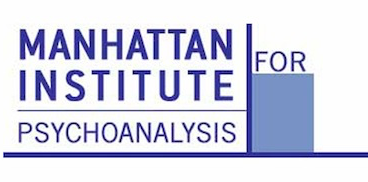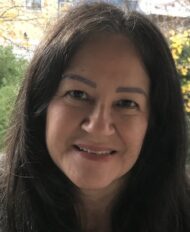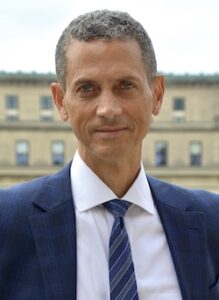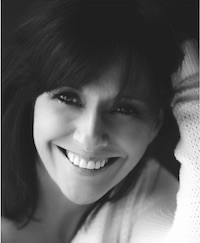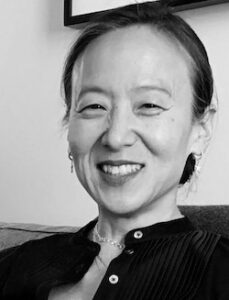The Manhattan Institute for Psychoanalysis One Year Certificate Program in Psychoanalysis and the Sociopolitical World is continuing to evolve after our inaugural year of 2021. In collaboration with CORE (The Committee on Race and Ethnicity), our program has been developed with intentionality from an anti-racist and anti-oppressive lens by placing thoughtful attention to historical trauma and social realities that shape the human experience emphasizing the influence of the social context and dynamics of power and inequality on intrapsychic and interpersonal processes. The program features teaching core technical components of psychoanalytic psychotherapy focusing on unconscious processes and the intersections of race with class, ethnicity, culture, sexuality and gender; immigration; transgenerational transmission of trauma; climate change; and current socio-political issues.
All classes are held on Zoom on Thursday evenings from 6:30pm to 10:00pm (Eastern Time).
Given the intersubjective lens from which we will be engaging in these challenging socio-political issues together, a required weekly process-group is included for additional candidate support. In addition, weekly individual case consultation is required for clinical training.
The program is geared toward early and mid-career clinicians and welcomes those who are interested in both a didactic and immersive learning experience. This program is built on contemporary psychoanalytic theory, relational and interpersonal in nature. Participants will be supported and expected to use introspection, critical thinking and self-reflection for what we hope will be a meaningful experience for their professional and personal lives.
The year-long program is divided into three trimesters, pairing a theory course with a clinical course each trimester. Overall, this dual approach, of clinical and theoretical work, is a dynamic opportunity for students to gain valuable theoretical knowledge, while also developing their own clinical style and the way they hear and engage with patients.
Students in the one-year program are welcome to attend various Institute events, such as colloquia and clinical meetings. These meetings provide a congenial forum for lively discussion and for the exchange of ideas among the presenters, candidates, analysts and guests. It is a wonderful opportunity to connect with our warm and esteemed community.
Students also are encouraged to join CORE (Committee on Race and Ethnicity) Dialogues which is a group that provides members of the MIP community a unique experience to learn how to have difficult conversations on race with each other.
Trimester 1
Theory Sequence: Race and Intersectionality in Psychoanalytic Practice, taught by Ricky Varghese PhD, RSW, FIPA and Sharmeen Khan, MSW, RSW.
This course aims to widen the scope of understanding and nuances in clinical practice with race and intersectional identities (class, ethnicity, culture, immigration, gender and sexuality) by integrating psychoanalytic concepts and critical theory. Clinical material will be presented.
Clinical Sequence: The Psychotherapeutic Relationship: Beginnings, taught by Julie Hyman, LCSW and Chanda Griffin, LCSW
This course will focus on the beginning of treatment, exploring the process of engaging a patient in therapy while attending to themes of identity, difference and power. How does the therapist establish a frame for the work, assess the patient, create a sense of safety, listen for the patient’s anxiety, resistances, and relationship themes? How does the therapist move from the patient’s initial concrete concerns to encouraging a sense of psychological curiosity in the patient?
Trimester 2
Theory Sequence: Immigration & The Climate and Environmental Crisis
The Invisible Hand of Whiteness and Forced Migration (taught by Rossanna Echegoyén);
The instructor will explore white supremacy as it relates to the current immigration crisis and psychoanalytic practice with immigrants by weaving clinical material with interdisciplinary scholarship. The “invisible hand of whiteness” implies hegemonic forces around the world, in particular Latin America, where white supremacy is the invisible force that subjugates and displaces people around the world. We will explore how U.S. foreign policy has contributed (and continues to contribute) to the mass exodus of people fleeing their home countries for safety and refuge in the United States. This class will be taught from an interdisciplinary lens including psychoanalysis, sociology, history, literature and film.
The Climate and Environmental Crisis (taught by Wendy Greenspun): This course will examine the interconnected and embedded roots of the climate crisis and systemic injustices, including the differential impacts of climate change on marginalized communities. We will consider ways to work with our emotional reactions as clinicians facing the same multi-layered crisis and will utilize knowledge from psychoanalytic systems and trauma theories to engage clinically in our consulting rooms and beyond.
Clinical Sequence: The Psychotherapeutic Relationship: Elaborations, taught by Sherwood McPhaul, LCSW-R
With attention to the roles of class, social context, history, and the therapist’s identity, this course will focus on ways the therapist and patient enrich the treatment process. Psychoanalytic concepts addressed include transference and countertransference; projection, introjection and containment; project identification; mutual enactments; and individual and collective trauma.
Trimester 3
Theory Sequence: Guest Lecturers, including:
The Implications of Sameness and Difference: Effects of Colonization on Puerto Ricans who live on the Island and the mainland taught by Debra Domenech-Ristorucci, Ph.D
This course will address historical implications of colonization on Puerto Ricans who live on the island and those who live on the mainland. The discourse will review the history of the Commonwealth of Puerto Rico and weave in the influence of sociocultural factors, such as Taino, Spanish and African cultures on the Puerto Rican Diaspora. A focus on the intersection of culture, race, language, socio-politics with identity, self-worth and narcissism will be considered in transference/countertransference dynamics.
Trauma, Truth and Care: Opportunities for Psychoanalysis taught by Betty Teng, LMSW, MFA
Through readings, podcasts and a case study, we will consider the concepts of Trauma, Truth and Care which sit at the intersection of the psychological and the sociopolitical in the U.S. How can we recognize historical trauma (such as slavery, the displacement and genocide of Native Americans and the forced internment of Japanese Americans during WWII) being repeated in modern day times with the murder of George Floyd and the siege of the US Capitol? How can we recognize that we are blind to these traumas as we ourselves are the perpetrators? As American psychoanalysts, we are uniquely positioned to consider sociopolitical blindness by offering ways to break this cycle; central to our practice is to meet the traumas of our patients with truth and care. In this polarized and volatile sociopolitical time, the tools of psychoanalysis — such as the prioritization of thinking over acting out and the deep consideration of unconscious processes — are particularly useful in making psychological sense of what can seem like sociopolitical nonsense. In so doing, we have an opportunity to prevent further harm. We will discuss a case study where a psychoanalytic institute turns a blind eye to harm. How do we turn our powerful lens of psychoanalytic reflection upon ourselves and our professional communities to meet difficult Truths and take greater Care? In other words, can we open our session doors to the sociopolitical and deploy our honed skills of reflection to help not only our patients — but our communities, our society and ourselves? By applying psychoanalysis to the sociopolitical and considering ourselves as both citizens and analysts can we become more inclusive, more equitable, more respectful — and more humane?
A Bridge Called My Back: Intergenerational Trauma taught by Valerie Bryant, Ph.D., LCSW, EMDR, SEP
Through course readings and class discussions, students will learn how to understand and identify individual and collective trans-generational trauma under the rubric of attachment theory, the conspiracy of silence, unconscious generational psychic structures, and racial reenactments. The material will be considered within a relational and somatic lens, and a sociocultural, and political context.
Understanding and De-pathologizing the Asian American Experience of Assimilation taught by Priti Doshi, LP
We will focus on the Asian/Asian-American experience of assimilation into a predominately white American culture and the successes and failures that come with such a large undertaking. We will be looking at the dissociated and repressed processes at play as well as the intergenerational transmission of trauma and resilience that occur. We will keep in mind how diverse the Asian/Asian American population is in the United States, as the term is geographically and culturally expansive and often lumps the complexity of varied groups of people under one umbrella. The course readings will integrate psychoanalytic thinkers with material from other disciplines to enrich and open up the class discussion.
Radical Openness taught by Anton Hart, PhD
In this course I will present my concept of Radical Openness, addressing both its clinical and also its more general applications to meaningful dialogue between persons. Radical openness, derived from psychoanalytic and hermeneutic theories, will be seen to have broad application to dialogue between people in dyads, groups and organizations alike.
Clinical Sequence
The Psychotherapeutic Relationship: Group Process and Supervision, taught by Stefan R. Zicht, PsyD
This will be a space for peer case consultation and group process of the training experience. This module will focus on facilitating the group members’ capacities to balance theoretical commitments with personalistic participation, in the co-creation of a viable psychoanalytic process.
The Affective Learning Process Group, facilitated by Susan Rios, LCSW
The Affective Learning Process Group is a unique OYP component that requires candidates to attend to both cognitive and emotional aspects of their training experience. The group potentiates a space for candidates to interact freely with each other outside of classes with a possibility for the re-experiencing or recreating of some of the interpersonal/intersectional dynamics that are being highlighted in the OYP curriculum.
Interpersonal interactions in the group promote a deeper level of self-awareness and can further enhance an understanding of intersectional relational dynamics. Additionally, the group affords members an opportunity to give support and feedback, and to work with the reactions and responses that other candidate’s contributions bring up for them. The overall goal of this OYP component is to bring experiential learning to psychoanalytic and socio-political concepts in vivo.
The weekly OYP process group runs Thursdays from 2:00-3:30PM (EST)
FACULTY
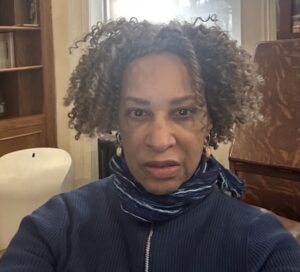
Valerie Bryant, Ph.D., LCSW, is a board member, faculty member, supervisor, and case consultant at the Manhattan Institute for Psychoanalysis (MIP) Certificate Program in Trauma Studies. She also serves as an adjunct at NYU Silver School of Social Work and affiliates with the trauma programs at the Institute for Contemporary Psychotherapy and the National Institute for Psychotherapies. She specializes in early developmental, complex, and intergenerational trauma. She is published and has a full-time private practice in integrative relational psychoanalysis using somatic experiencing.
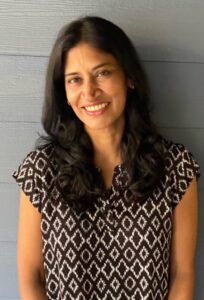
Tara Chivukula, LCSW
email:: chivukulatara@gmail.com
Phone: 646-361-6621
Website: www.tarachivukula.com
Debra Domenech-Ristorucci, Ph.D is a bilingual, (English and Spanish), bicultural clinical psychologist and psychoanalyst, native New Yorker born to Puerto Rican parents. A graduate of NYU Postdoctoral Program in Psychotherapy and Psychoanalysis, she has extensive community mental health experience as a clinician and directing programs at the South Bronx Mental Health Council and later served as Supervising Psychologist at St. Luke’s-Roosevelt Adult Outpatient Center. She currently is a Senior Psychologist and Associate Director for Postdoctoral Training at Counseling and Psychological Services at Columbia University and has a private practice in NYC. Dr. Domenech-Ristorucci is interested in topics on diversity, bereavement, college mental health and the Latino experience. She has presented at various conferences with her most recent presentation in Puerto Rico on Bereavement Group Work among College Students.
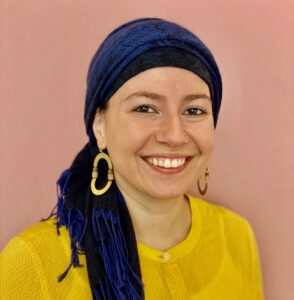
Sara Ghalaini is a Licensed Independent Clinical Social Worker (LICSW) based in the Bay Area of California who has an expertise in Trauma-Informed Clinical Child and Family Intervention, as well as the facilitation of transformative group processes within professional settings. In her private practice, Sara offers her clients a blend of psychotherapy and coaching integrated with Trauma-Informed approaches. Across her work, Sara has a commitment to affirming and reflective practices, structural and interpersonal analysis, and authenticity and connection. Sara’s background as an Arab and Muslim immigrant has played a pivotal role in shaping her holistic perspective. Educated by both Eastern and Western philosophies, she adeptly bridges the gap between cultures, enriching her practice with a deep understanding of diverse worldviews. This unique blend allows her to connect with clients on a profound level, fostering trust and authenticity in every interaction. Beyond her clinical practice, Sara is published and serves as an Adjunct Professor at Smith College School for Social Work, which allows her to engage the next generation of social workers, equipping them with the tools and insights needed to create meaningful change in their communities.
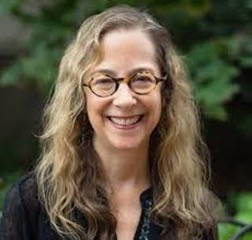
Wendy Greenspun, PhD, is faculty and supervisor at the Manhattan for Psychoanalysis, and Adelphi University’s Postgraduate Program in Marriage and Couples Therapy. She is also on faculty at the William Alanson White Couple Therapy Training and Education Program. She is a graduate of the Manhattan Institute’s Certificate Program in Psychoanalysis and served as co-chair of the Curriculum Committee. She has published and presented papers and workshops nationally and internationally on climate psychology, taught courses on Ecopsychoanalysis, and was conference co-chair for the Manhattan Institute’s December 2020 conference on Psychoanalysis and Climate Change. She is a Board Member of the Climate Psychology Alliance- North America and trained in Al Gore’s Climate Reality Leadership program. She is in private practice in Manhattan.
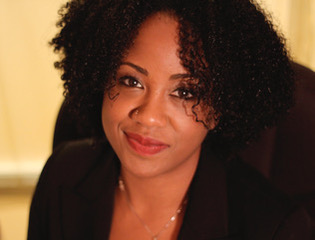
Chanda D. Griffin, LCSW, is a teaching, training, and supervising analyst at the Manhattan Institute for Psychoanalysis (MIP) and co-chair of the Committee on Race and Ethnicity at MIP. Addtionally, she is a faculty member of the National Institute For the Psychotherapies. (NIP) and an Adjunct Professor at the Silberman Graduate School of Social Work at Hunter College. Chanda is a member of Black Psychoanalysts Speak and is in private practice in New York City.
Dr. Anton Hart, PhD, FABP, FIPA is Training and Supervising Analyst and Faculty of the William Alanson White Institute. He presents and consults nationally and internationally. He is a member of the Editorial Boards of Psychoanalytic Psychology and Contemporary Psychoanalysis. He has published articles and book chapters on a variety of subjects including psychoanalytic safety and mutuality, issues of racial, sexual and other diversities, and psychoanalytic pedagogy. He is a member of the group, Black Psychoanalysts Speak, and, also, Co-produced and was featured in the documentary film of the same name. He teaches at The Manhattan Institute, Mt. Sinai Hospital, the Institute for Contemporary Psychotherapy, the National Institute for the Psychotherapies National Training Program, the New York Psychoanalytic Institute, the Institute for Relational Psychoanalysis of Philadelphia, and the NYU Postdoctoral Program in Psychoanalysis. He serves as Co-Chair of the Holmes Commission on Racial Equality in the American Psychoanalytic Association. He is in full-time private practice of psychoanalysis, individual and couple psychotherapy, psychotherapy supervision and consultation, and organizational consultation, in New York.
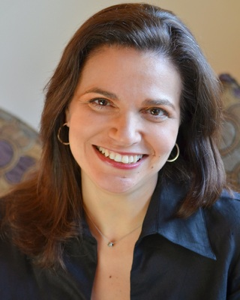
Julie Hyman, LCSW is faculty and supervisor at Manhattan Institute for Psychoanalysis (MIP) and faculty at the Psychoanalytic Psychotherapy Study Center (PPSC). Julie is a member of the Committee on Race and Ethnicity (CORE) at MIP. as well as co-chair of curriculum. She is in private practice in New York City.
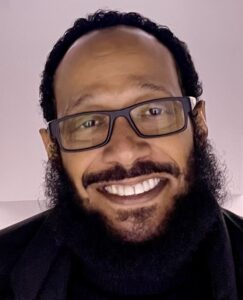
Sherwood McPhaul, LCSW-R, is a graduate from New York University, Silver School of Social Work and graduate of the Manhattan Institute for Psychoanalysis (MIP), where he is an active member on the MIP Committee on Race & Ethnicity (CORE), on faculty, supervising psychoanalyst, training psychoanalyst, and Director of the One Year Program: Psychoanalysis and the Sociopolitical World. In addition, he is on faculty at the National Institute for Psychotherapies, the Institute for Relational Psychoanalysis of Philadelphia, and is a proud member of Black Psychoanalysts Speaks. Sherwood is an adjunct clinical professor at Hunter College Silberman School of Social Work and is a private practicing psychoanalyst with advanced training in complex trauma in New York City’s Midtown area working with adolescents and adults, specializing in the treatment of Black men with a history of childhood sexual abuse, intergenerational trauma, anxiety, depression, and substance abuse, with a focus on interpersonal, existential psychoanalytic theory, race & racism, sexuality & gender.
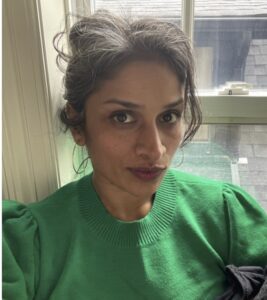
Sharmeen Khan, MSW, RSW is a psychoanalyst, a clinical social worker and a mother of two. She has practiced psychotherapy in New York, Jakarta, and now in Toronto, where she has a full time private practice working with adults and couples. In addition, she was an Adjunct Professor at the Silver School of Social Work at NYU with a focus on diversity, systems of oppression, and working in post 9/11 New York.
Susan Rios, M.S., LCSW is faculty, supervisor and training analyst at the Manhattan Institute for Psychoanalysis, (MIP,) Group-Process Facilitator in the MIP One Year Program, visiting faculty at the Chicago Center for Psychoanalysis (CCP) and prior consultant to the MIP Committee on Race and Ethnicity, (CORE). She is in private practice in NYC, providing supervision, organizational consultation, individual and group psychotherapy.
Betty P. Teng LMSW, MFA is a psychoanalyst and trauma therapist who has worked with survivors of sexual assault, political torture, domestic violence and childhood molestation at Mount Sinai Beth Israel’s Victims Services Program and the Bellevue/NYU Program for Survivors of Torture in Manhattan. As one of the co-authors of the New York Times bestseller The Dangerous Case of Donald Trump, she has written and spoken widely on the #MeToo movement, racial trauma and the trauma of Trump and Trumpism. Betty is also co-founder and co-host of the psycho-political podcast, Mind of State. She is based in New York and sees patients — adults, adolescents and couples — in private practice.
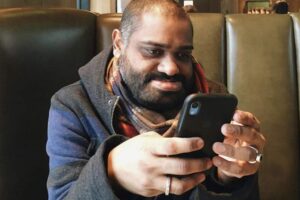
Ricky Varghese PhD, RSW, FIPA is a psychoanalyst and writer based in Toronto. He writes about sex and death, queer porn and art, memory and memoir, and Judaism and Kerala—not always in that order. He has edited Raw: PrEP, Pedagogy, and the Politics of Barebacking (University of Regina Press, 2019) and the forthcoming Little Deaths: Politics and Psychoanalysis in the Age of Pandemics (University of Regina Press, 2025). Presently, he is also completing two monographs: The Look Back: Mourning, Melancholia, and the Madness of Loss is a study linking the experience of melancholia in the works of Sigmund Freud and Walter Benjamin, while Leave-taking: Sex, Death, Ethics is an exploration of the relationship between suicidality, late capitalism, and the death drive. His writings have appeared in publications such as the Los Angeles Review of Books, the LARB Quarterly, Porn Studies, Drain Magazine, and the Gay and Lesbian Quarterly, to name a few. More recently, he has been developing an interest in psychoanalytic education and the training of analysts, alongside a research focus on what he likes to consider the “analyst’s analysis.”
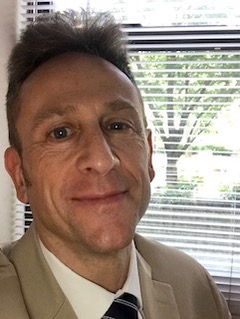
Stefan R. Zicht, Psy.D., FABP, FIPA is a Past Co-Director, Training Analyst, Faculty and Supervisor at Manhattan Institute for Psychoanalysis; Supervising Analyst, Faculty, Fellow, and Former Director of the Licensure-Qualifying Program in Psychoanalysis at the William Alanson White Institute of Psychiatry, Psychoanalysis and Psychology; Faculty and Supervisor at Metropolitan Institute for Training in Psychoanalytic Psychotherapy; Faculty, Institute for Contemporary Psychotherapy; Faculty, National Institute for the Psychotherapies; Assistant Clinical Professor of Psychiatry, Icahn School of Medicine at Mount Sinai; and Associate Editor, Contemporary Psychoanalysis. He is a former President of the Division of Psychoanalysis, New York State Psychological Association; and is a Fellow of the American Board of Psychoanalysis (FABP) and the International Psychoanalytical Association (FIPA.) He is in full-time private practice of psychoanalysis, psychotherapy, couples therapy and supervision and consultation in New York City, and has published papers in Contemporary Psychoanalysis, The American Journal of Psychoanalysis, and Psychoanalytic Quarterly on psychoanalytic supervision, interpersonal and relational psychoanalysis, Sigmund Freud, and narcissism, in addition to having presented nationally at APA’s Division of Psychoanalysis, the International Forum for Psychoanalytic Education, the International Federation of Psychoanalytic Societies, and the American Psychoanalytic Association.
ADMISSION
Manhattan Institute’s One-Year Program welcomes applicants from various levels of experience and expertise.
Applicants must be at least a masters level licensed mental health professional and must submit the following:
• A written application and two letters of recommendation
• Undergraduate and graduate transcripts
• $50 non-refundable application fee
All applicants will be interviewed by Institute representatives.
Applicants are required to carry their own professional liability insurance.
Click here for application materials.
Please see below to pay the application fee.
TRAINING REQUIREMENTS
- Students will complete and participate in three trimesters of academic courses. Classes are held virtually on Thursday evenings from 6:30pm to 10:00 pm (Eastern Time) on Zoom. Two classes are held each week on Thursdays with a short break between classes. The academic year runs from September to June with three trimesters of 10- weeks each.
- Students are required to attend the Affective Learning Group on Thursdays from 2:00-3:30PM (EST) (Eastern Time) throughout the academic year.
- Weekly Case Consultation is required as students are expected to follow a patient in treatment throughout the academic year. Students are expected to present their own patient(s) for 30 hours of case consultation and will need to carry their own professional liability insurance. Upon admission, students will receive a list of Case Consultants. The cost of Case Consultation is $75.00 per hour.
- For students with a professional license in New York, continuing education credits are available for the entire program, however 100% attendance is required to obtain CEU credits.
- A certificate is awarded upon successful completion of the program.
- While students are not required to be in psychotherapy, it is strongly recommended. The Institute offers low fee psychotherapy and psychoanalysis with selected faculty and graduates. A student who chooses to do three times weekly psychoanalysis, with an accredited analyst, may use these hours toward the fulfillment of treatment requirements in the Analytic Training Program if s/he elects to continue training.
FEES AND EXPENSES
- The cost of the program for academic year 2024-25 is $3500.00. Case consultation is TBA per session. Psychotherapy fees are negotiated with the individual’s therapist.
- Graduates of the program who elect to continue into the Certificate Program in Psychoanalysis will receive a one-time tuition rebate of $300 towards their first trimester of training.
- Tuition is due no later than 2 weeks before the start of classes.
